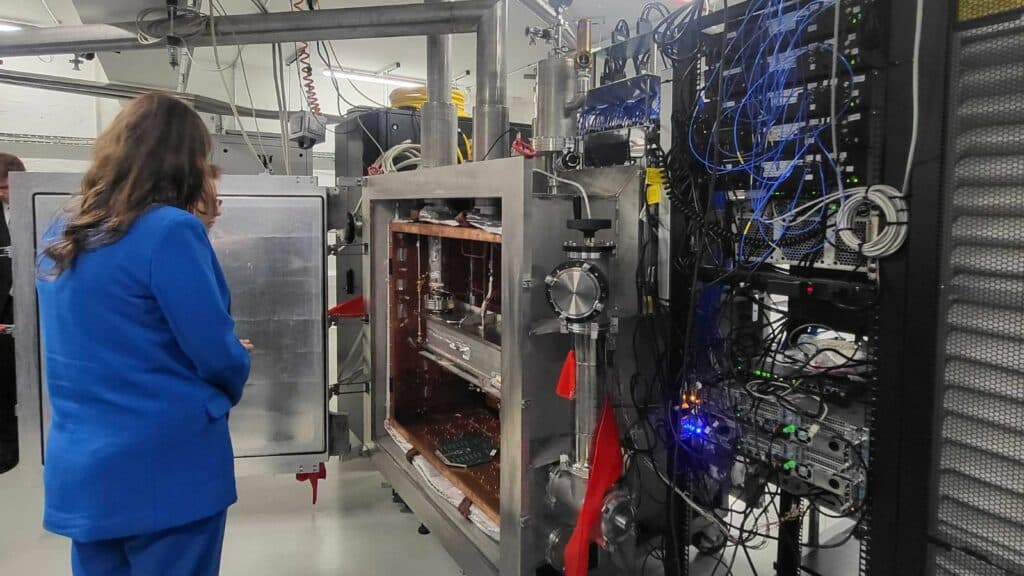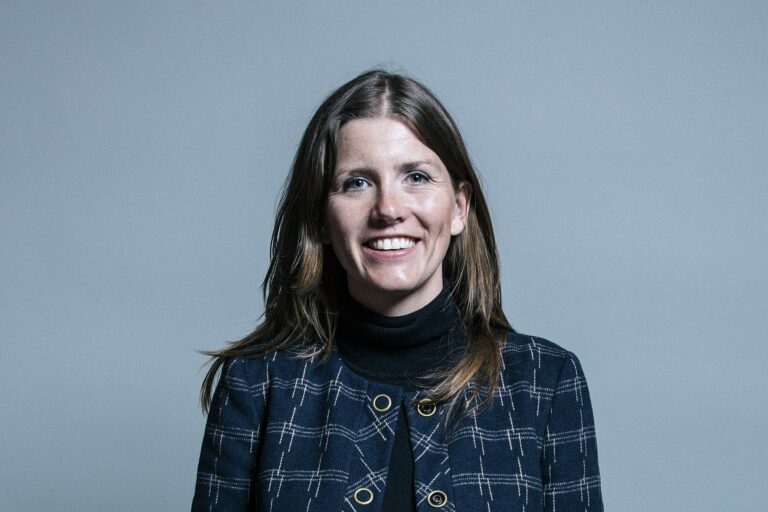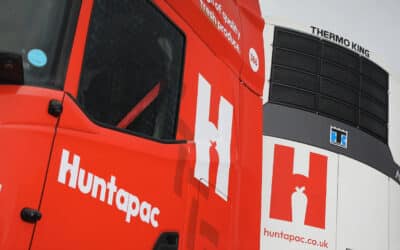At the launch event of a new quantum computing lab, backed by £9m of government funding in Cheshire, the new Secretary of State for Science, Innovation and Technology said the North was “incredibly important” to the UK’s tech sector – but could not name any actual Northern tech companies.
Michelle Donelan was visiting the brand new lab unveiled by US firm PsiQuantum at Sci-Tech Daresbury, where she also launched a new strategy for the UK’s membership of science institution CERN.
Following the event, Prolific North sat down with Donelan and although she stressed the importance of the North to the UK’s tech sector, could not actually name any innovative Northern tech companies, besides the ones at the event.
“The most innovative Northern tech companies? Urm… I’m trying to think of ones I’ve met that have been innovative…,” said Donelan.
“There’s loads that I have met at the [Conservative Party] conference, where there’s people that have been working in AI and different types of sectors.”
We can name a few. How about two of Manchester’s tech unicorns – private companies with a valuation of more than £1bn – AI firm Matillion or ecommerce group THG? Sheffield has its own tech unicorn too with ITM Power paving the way forwards for green hydrogen technologies.
Look to Leeds and you’ll find the likes of Panintelligence, with co-founder and CEO Zandra Moore serving as regional sub-group head of the government-founded High Growth Enterprise Taskforce.
Steering away from naming companies, Donelan continued: “The thing I think is quite fantastic about the UK, whilst we do have some key clusters and a cluster here [in Daresbury] of particular skill-sets, there are opportunities around for you to work in different areas.
“We want to be able to ensure that is the case by opening up connectivity, which is why we are now launching another tier to our connectivity plans for satellite broadband so that people that want to work in more remote areas can do so.”

But if the North had that same connectivity the South has in the Golden Triangle – Oxford, Cambridge, London – would the tech sector here be more successful?
“The Golden Triangle, obviously, is world renowned. But what we want to do is to get more research and development funding outside around the UK, not just located in the Golden Triangle, because opportunities should be spread.
“That’s the very basis of levelling up and we’re certainly on track to deliver that. That’s what we’ve been doing.”
On those opportunities, Donelan referenced the £60m Regional Innovation Fund for R&D across the UK, announced at the Conservative Party Conference this week, which will be distributed by universities. A “chunk” of that will be going to the North to “utilise the skills here”.
“In my department, we’re focused on digital connectivity and future telecoms, so that as well as being able to jump on a train or a bus to get somewhere, you can also work from your local area.”
But we couldn’t talk about connectivity without mentioning HS2, which undoubtedly overshadowed the conference.
Our interview followed Rishi Sunak’s first speech to the Conservative Party Conference as prime minister, where he finally confirmed the cancellation of the Northern leg of the HS2 high-speed rail link with ‘Network North’ taking its place.
Backlash against the unsurprising cancellation of the Northern leg of HS2, the high speed line to Manchester, was already in full force across the North. Businesses with major northern presences, such as Bruntwood and Manchester United, had already penned a letter to the prime minister warning that “cancelling HS2 would be a major act of economic self-sabotage and damage our international standing as a place to do business”.
On what she would say to those businesses, Donelan said: “There’s been a great deal of speculation about this announcement for a number of days. Those people were speculating without any knowledge of what was being put in its place.
“I can understand why people were very concerned because they thought the money that had been allocated to connectivity within the North was being taken away and spent on something else, like health or education.
“Hopefully, what the prime minister has set out shows that the same money is going in but it’s going in a way that will help more people across the North, not just the people of Manchester, but also the people of Liverpool and Leeds in particular.”
“This government is delivering for more people in the North”
Post announcement there were plenty of comments emerging from leaders across the North. One of those came from James Forrester, managing director of Newcastle property developer Stripe Property Group, who said there’s “no surprise at yet another Government U-turn and more broken promises that will see many businesses and homeowners alike suffer, as a result.”
Quizzed on comments like this, and why anyone in the North would believe the Conservative Party now on the back of u-turns, Donelan replied: “What this government is doing is delivering for more people in the North.
“This [new plan] is much more targeted in terms of a collection of different areas and connectivity from east to west, not just north to south, which we know is particularly important for boosting local economies.
“I do think we should be evidence based as a government, I do think that we should be looking at how we can actually support local economies. If that means changing course, then we should have the courage to stand up and say so.”
But isn’t ‘Network North’ just a rehash of the promised Northern Powerhouse Rail?
“No, what we’ve said today is that we’re going to use exactly the same money that had been dedicated, the £36bn.
“It’s not the case that taxpayers’ money is going to be used elsewhere when they’ve been told it was going to be used on connectivity, but it’s going to be used more effectively.”
Since the pandemic, rail usage patterns are “down 20%” and it doesn’t “reflect how people are doing business and how they are travelling to work”.
She added: “Our infrastructure does actually have to support the modern way of working. That’s what we’ve done as a government. We’ve reviewed the evidence and said this [new plan] is going to help support more local economies.”
With a “mission to make the UK a science and tech superpower in 2030” how is the government encouraging more investment and funding across the North?
Alongside R&D tax credits which she describes as the “most generous in the world”, the government has also been “trying to channel outward investment into the UK” through the likes of the Mansion House Reforms.
“We are trying to create a climate where companies can not just start up in the UK, in the North West, but also scale up, grow and stay here too. We have seen too many companies growing to a certain size and then leaving the UK which doesn’t create the local jobs.”
As well as providing PsiQuantum with a £9m grant to deliver its first R&D facility anywhere outside the US, which is hoped will further boost the growing cluster of quantum research firms around Daresbury, the government is “looking ahead”.
From looking at future skills, the right regulatory environment, and having the “right support for investors” to achieve that goal of becoming a UK science and tech superpower will mean “more jobs in the UK, more jobs in the North West”.










